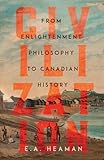Civilization : from enlightenment philosophy to Canadian history / E.A. Heaman.
Material type: TextPublication details: Montreal ; Kingston ; London ; Chicago : McGill-Queen's University Press, (c)2022.Description: 1 online resourceContent type:
TextPublication details: Montreal ; Kingston ; London ; Chicago : McGill-Queen's University Press, (c)2022.Description: 1 online resourceContent type: - text
- computer
- online resource
- 9780228012870
- F1032 .C585 2022
- COPYRIGHT NOT covered - Click this link to request copyright permission: https://lib.ciu.edu/copyright-request-form
| Item type | Current library | Collection | Call number | URL | Status | Date due | Barcode | |
|---|---|---|---|---|---|---|---|---|
 Online Book (LOGIN USING YOUR MY CIU LOGIN AND PASSWORD)
Online Book (LOGIN USING YOUR MY CIU LOGIN AND PASSWORD)
|
G. Allen Fleece Library ONLINE | Non-fiction | F1032 (Browse shelf(Opens below)) | Link to resource | Available | on1303574405 |
Browsing G. Allen Fleece Library shelves, Shelving location: ONLINE, Collection: Non-fiction Close shelf browser (Hides shelf browser)
Includes bibliographies and index.
Enlightenment, Self-Civilization, and Decivilization: Hume vs Franklin -- "Am I Your Slave?": Gendering Civilization -- Tory Civilization in the 1820s: The Darling Report -- Liberal Civilization in the 1830s: The Durham Report -- The Sociology of Civilization in the 1840s: The Bagot Report -- Democratic Civilization in the 1850s: Joseph-Charles Taché and Political Voice -- Constitutional Civilization in the 1860s: John A. Macdonald and Confederation -- History's Civilization: Daniel Wilson and the End of History.
"Colonial Canada changed enormously between the 1760s and the 1860s, the Conquest and Confederation, but the idea of civilization seen to guide those transformations changed still more. A cosmopolitan and optimistic theory of history was written into the founding Canadian constitution as a check on state violence, only to be reversed and undone over the next century. Civilization was hegemony, a contradictory theory of unrestrained power and restraints on that power. Occupying a middle ground between British and American hegemonies, all the different peoples living in Canada felt those contradictions very sharply. Both Britain and America came to despair of bending Canada violently to their will, and new forms of hegemony, a greater reckoning with soft power, emerged in the wake of those failures. E.A. Heaman shows that the view from colonial Canada matters for intellectual and political history. Canada posed serious challenges to the Scottish Enlightenment, the Pax Britannia, American manifest destiny, and the emerging model of the nation state. David Hume's theory of history shaped the Canadian imaginary, in constitutional documents, much-thumbed histories, and a certain liberal-conservative political and financial orientation. But as settlers flooded across the continent, cosmopolitanism became chauvinism, and the idea of civilization was put to accomplishing plunder and predation on a transcontinental scale. Case studies show crucial moments of conceptual reversal, some broadly representative and some unique to Canada. Dissecting the Seven Years' War, domestic relations, the fiscal military state, liberal reform, social statistics, democracy, constitutionalism, and scholarly history, Heaman shows how key British and Canadian public figures grappled with the growing gap between theory and practice. By historicizing the concept of civilization, this book connects Enlightenment ideals and anti-colonialism, shown in contest with colonialism in Canada before Confederation."--
COPYRIGHT NOT covered - Click this link to request copyright permission:
There are no comments on this title.







